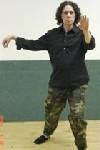What do we expect? What would Don Draper do? How do the characters “manage people’s expectations”? How are others able to use and manipulate us because we "expect" them to behave a certain way? The level of social contracts contains a framework within which we expect people to act and respond. The characters who trump that level with their willful expedience to take the game beyond the boundary triumph as the winners. They act on their needs and how to attain them beyond societal norms.
DISCLAIMER: The essay below contains plot spoilers about Season 2, Episode 3: "The Benefactor." If you haven't seen that episode, check out the Mad Men schedule on amctv.com to see when encore presentations are airing or download it from iTunes.
"The Benefactor" (episode #16) of Mad Men involves five couples: Drapers, Barretts, Schillings, Harry and his pregnant wife Jennifer, Arthur and his girlfriend Tara. Each of those couples demonstrates surface of expectations (e.g., contractual fidelity) and how those expectations really play out under the table and/or below the belt.
For example, the couple of comic Jimmy Barrett and his manager/maybe-wife/(sister-in-the-old-days) Bobbie have very low expectations around "fidelity." It's all business and survival. In the open, Jimmy goes beyond politeness and totally insults the obese Mrs. Schilling as a semblance of the Hindenburg. He ceases to stop and dumps on with “buffalo” and “whale” comparisons. Getting drunk on a contracted promotional shoot doesn’t faze him as wrong or inappropriate. People expect it. Later in the episode, Bobbie tells Don on the phone that Jimmy is auditioning at the Copa nightclub – controlled by the Mob in those days. That’s hard ball rules.
Bobbie thinks (expects) she can intimidate Don Draper as if he plays by the understood rules of propriety in business dealings. She will discover that Don plays hard ball better than she does. Bobbie expects a payoff for her behavior but doesn't get one. The turning moment is the command-performance sex in the front seat of Don’s car during the hailstorm. He protests, “I don't want to do this.” She retorts, “(IT) doesn't feel that way.” In the powder room at Lutece, Don manipulates Bobbie's expectations of his need/affection/lust for her. Don threatens to ruin Jimmy if she does not prompt him for the apology to Mrs. Schilling.
The insulted Schillings deserve but barely expect an apology from the likes of Jimmy Barrett. Mrs. Schilling “knows that’s what (Jimmy does) but she doesn’t have the stomach for it.”
Harry's wife Jennifer expects him to ask for a raise. She also has expectations that they somehow “deserve” the money because they need it for the coming baby. Oh my, how times have changed.
Arthur, the handsome rider, expects to be treated as “the rooster” at the stable but discovers that Betty turns down his advances. Immediately revealed are imbalances of money (she's got it) and dimorphism (he is much larger than she is). Arthur's relationship with Tara seems to be social climbing, expedient and unequally balanced.
Betty Draper defends her fidelity and performs as Don's “better half.” She understands the game and asks Don if the business dinner at Lutece will be an occasion for her to “talk” (i.e., participate in the conversation) or one in which she is expected to be silent. When the evening ends with Betty cuddling cozy next to Don in the car, she expects him to recognize that they “make a great team.” ///
Tuesday, August 12, 2008
Manage Expectations on Mad Men's "The Benefactor"
Subscribe to:
Post Comments (Atom)

No comments:
Post a Comment